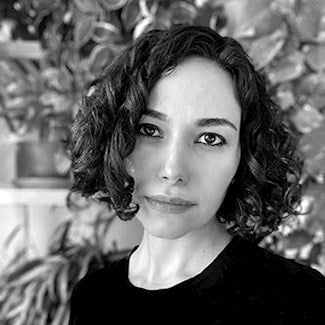Ghazal Jafari
Education
Harvard Graduate School of Design (GSD), Doctor of Design (DDes)
University of Toronto, Master of Urban Design (MUD)
Shahid Beheshti University (Tehran), Bachelor of Architecture (BArch)
Biography
Ghazal Jafari is an award-winning designer, environmental scholar, and weaver, trained as an architect and urban designer. Her interdisciplinary expertise brings together climate, conflict geographies, infrastructural ecologies, cultural narratives, and urban challenges. Ghazal’s scholarship is informed by non-Western spatial traditions and feminist liberation discourses, as well as her formal education in Iranian, American, and Canadian Universities—including a Doctor of Design in Urbanism, Landscape, and Ecology from Harvard GSD. Her current work lies at the intersection of water-related issues, extreme heat, geopolitical transformation of space, and ecologies of survival. While deeply rooted in historical inquiry, her approach is both projective and post-extractivist in essence.
Supported by the Graham Foundation for Advanced Studies in the Fine Arts and the 3Cavaliers program at University of Virginia, her current research and book, titled Goat Treatise investigates geospatial transformations of the Iran-Iraq riverine borderlands in the past 150 years. Weaving together histories of environmental change and imperialism, the project reveals the conflict-ridden borderlands not only as geographic manifestations of global politics but as sites of resistance and transcendence. Central to this counter-narrative are women, tribal migrations, Indigenous environmental literacies and land management, and trans-species relations. As part of this endeavor, Ghazal has elucidated on the entanglements of women’s liberation and environmental justice in “Woman, Water, Freedom,” Journal of Architectural Education 78: Infidelities (2024). Recent related publications also include “Silent Siege: In the Shadow Landscapes of Sanctions” in Constructing Invisibility: Infrastructure, Militarization, and the Extreme Environment (ORO Editions, 2025).
Fibers of Life: Interpreting the Black Tent (2025-27) is an experimental research, design, and fabrication project on textiles, cultural heritage, and landscapes of survival. The project centers textile as an active art form and a performative element in the sustainable accommodation of life and livable spaces. This project contributes to the expanding definition of resilience and material sustainability by tracing the earthbound contingencies of textiles—between plants, animals, microorganisms, micronutrients, biodiversity, landscape conservation, rural economies, cultural heritage, and territorial relations. In doing so, it draws attention to regional ecologies, infrastructures, and the labor embedded in the woven matter, as a subject of relevance for artists, architects, ecologists, planners, and policymakers, among others.
Bringing archival activism to the Amazonian Andes during the COVID-19 pandemic and public health concerns, Ghazal’s co-authored book A Botany of Violence (ORO Editions, 2022) demystifies the history of the cinchona plant—the only known natural cure for malaria—originally belonging to the Loja region and Kichwa people. It traces histories of botanical violence surrounding cinchona across changing waves of extraction and colonialism in the past five centuries and brings attention to the world of flora at the center of current territorial conflicts and Afro-Indigenous futures across the Andes and the Amazon. This book was reviewed by Māori scholar Rod Barnett in “The Dog Barks,” Places Journal (March 2023). Accompanying this publication was a traveling multimedia exhibition first displayed at the 17th Venice Architecture Biennale (2021), as The Quino Treaty / El Tratado Del Quino, and later at the Elmaleh Gallery, UVA School of Architecture (2022) as La Flora Del Futuro. As part of this broader initiative, Ghazal organized a symposium titled Towards a Flora of the Future: An Initiative on Plants, Climate Activism, Territorial Justice, & Liberatory Feminism (Feb 2022) at UVA School of Architecture.
Ghazal is a cofounder of Open Systems, a non-profit 501(c)(3) organization dedicated to public education and opening systemic knowledge. The organization’s collective work amounted in a series of printed and open-source online publications, including “No Design on Stolen Land: Dismantling Design’s Dehumanizing White Supremacy,” Architectural Design 90 (2020), Landscape as Resistance: Pretexts, Subtexts, Contexts In Struggles For Environmental Justice, an edited open-source reader (2016-2021), Confronting Columbus, an open-Source education guide and archive (2019-20); The Missing 400: On The Erasure Of Women From The Urban Environment, book and videographic essay (2016-18).
Further publications include coedited book New Geographies: Posthuman (Actar, 2018), “Expulsion by Design,” in Margin and Text: Amplifying Diverse Voices in Architecture (Princeton Architecture Press, 2024), Grounding UPS: An Infrastructural Ethnography of a Logistics Corporation (doctoral dissertation, Harvard GSD, 2018), and “Tehran: Planning the Unpredictable,” Manu 17: Next Urbanism (2012) among others.
Ghazal has been an Aga Khan doctoral fellow and a research fellow at the Weatherhead Center for International Affairs at Harvard University. She has received multiple design competition awards and recognitions, including the One Prize Award: Water as the Sixth Borough first prize (2011), Azure Magazine’s Annual Award (2012), YUL/MTL: Moving Landscapes Competition honorable mention (2011), and 6970 - The Spaces in Between Competition honorable mention (2013).
She currently teaches courses related to urban design, environmental planning, and representation. Ghazal’s multidimensional work and teaching show a long-term commitment to cross-cultural dialogue and active solidarity on shared matters of justice and self-determination.
Research Interests
Urban Design, Environmental justice, urban equity, infrastructural ecologies, landscape, Indigenous epistemologies, geopolitics, conflict zones, spaces of resistance, art, cultural heritage, more than human worlds, political self-determination
Current Courses:
PLAC 5820_Environmental Planning & Design (Urban Ecologies)
PLAC 5822_Plant Cultures and Ecologies (A Flora of the Future)
PLAN 6013_Communication and Planning Analysis (Selected Discourses and Applied Skills in Critical Cartography, Site Analysis, and Politics of Space)
Previous courses:
PLAN 5610_Neighborhood Planning Studio (Urban Repair in Richmond between Histories of Racial Marginalization and Climate Change)
PLAN 3500_Introduction to Urban Design (Selected Topics in Urban Ecologies, Economies, and Infrastructural Interdependencies)
PLAN 5500_Rivers of Conflict
LAR 7010_Landscape Design Studio III (Ecologies of Justice)
LAR 8102_Design Research Methods
LAR 7500_Race and Space
LAR 7010_Landscape Design Studio III (Landscapes of Lingering and Conviviality)
ALAR 8020_Research Studio (Northern Virginia’s Future Urban Corridor)
ALAR 8100_Thesis I
SARC 6100_Urbanizing Worlds

